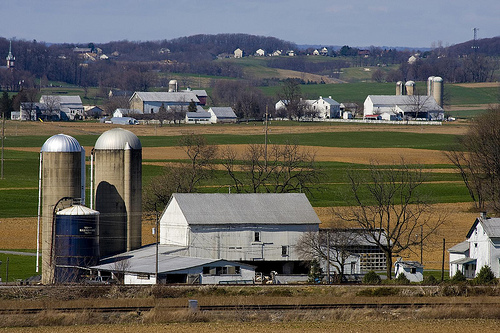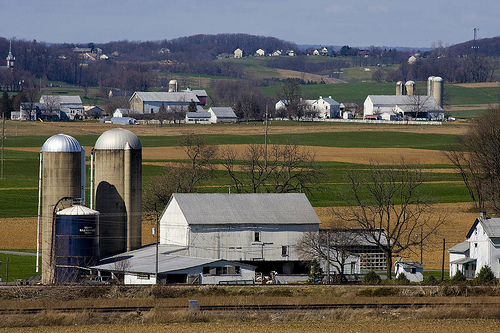 Photo: Jeff Cushner
Photo: Jeff Cushner
Update (Nov. 4, 2011): According to this SFGate article, the new bill is expected to be submitted to the congressional supercommittee as early as today (Friday). Rep. Ron Kind (D-Wisc.) (the same Kind who put forth the Kind-Flake amendment during the 2007-2008 Farm Bill process) has stepped up at the 11th hour to oppose the swift passage of a “Secret Farm Bill.” He told SFGate’s Washington D.C.-based reporter Stacy Finz: “Time is of the essence. This is a horrible process. It keeps Congress and the whole nation in the dark.”
An additional 26 additional members of congress signed on to Kind’s letter expressing their alarm.
“It has become apparent that some believe they can create new programs and entitlements with limited Congressional scrutiny and input. We urge the Joint Select Committee to resist proposals that would go beyond its mandate of deficit reduction and authorize new, complicated agriculture programs that have not been the subject of Congressional review,” they wrote.
Last week, we wrote about the likelihood that the $300 billion 2012 Farm Bill would take shape weeks before 2012 even begins, in the form of a dashed-off bill swept into the larger “supercommittee”-driven deficit-cutting process. As this week starts, that troubling prognosis remains.
In fact, last week, several congressional aides told agriculture trade publication Agweek that lawmakers planned to “work through the weekend to try to complete a Farm Bill proposal for the supercommittee in charge of deficit reduction by November 1.” But so far, nothing decisive has been announced.
This might explain why the food and farming advocacy site Food Democracy Now sent out an email this morning with the subject line “24 hours to stop the Secret Farm Bill.” The site asked subscribers to call a short list of senators and congressmen and tell them to say “‘No’ to the Secret Farm Bill,” because “rushing this vital piece of legislation behind closed doors is unfair and undemocratic.”
Sustainable food advocates have been struggling to adjust to this new reality. As the Institute for Agriculture and Trade Policy (IATP) described it last week:
No hearings, no amendments, no debate. Under this scenario, we may have very little idea about what is in the Farm Bill until after it has passed … It’s hard to overstate how messed up this is. We now have an environment where highly paid lobbyists thrive and citizen’s voices, along with real reforms, evaporate.
Oxfam American chimed in with a list of reasons Occupy Wall Street supporters aren’t likely to appreciate this rushed Farm Bill:
1. It was negotiated to satisfy high powered industry lobbies that pay lots of money to influence the Ag Committee.
2. It’s a giveaway to big industrial farms at the expense of family farmers.
3. It promotes unhealthy, unsustainable farming practices at the expense of sustainable farming.
4. It targets conservation and nutrition programs for cuts disproportionately.
The bill’s details remain unclear, but we know it will involve $23 billion in cuts. One Republican senator from Iowa went on record last week saying he believed the committee would cut $15 billion from farm subsidies and $4 billion each from conservation and nutrition. Another House conservative told the press that the cuts would “reduce farm subsidies about 20 percent and cut conservation spending about 10 percent. Nutrition programs, including food stamps, would be cut about 1 percent.”
Advocates for sustainable and local food movements have rushed out two bills of their own, to be included in the larger Farm Bill process. The Local and Regional Food Bill would bolster support for family farms, and “expand new farming opportunities and rural jobs, and invest in the local agriculture economy.” The Beginning Farmer Bill would help new farmers get access to capital (the lack of which is a well-known roadblock for beginning farmers) using microloans, matched savings accounts, and similar strategies.
Whether these additions have a chance of passing, or are simply symbolic, remains to be seen. Meanwhile, California food, farming, conservation, and environmental groups have been lobbying hard to have some say in the proposed Farm Bill. But the state — whose agricultural industry is said to produce more than 400 different crops, employ 800,000 people and generate annual revenues of $37.5 billion — will most likely continue to be left out of the discussion. One reason is that California farms don’t produce the bulk of those commodity crops — like corn, soy, and wheat — that farm bills tend to concentrate on.
As a reporter in the San Francisco Chronicle wrote:
Currently, California receives only about 5 percent of the money set aside for farm programs despite producing 12 percent of the country’s total agricultural revenue. And with the proposed cuts, the state could get even less.
Given Congress’s appetite for budget-cutting, there’s no guarantee that stopping this “Secret Farm Bill” from being passed, as Food Democracy Now is advocating, would produce an outcome more favorable to the good food movement. In a short article about the Farm Bill process, veteran agriculture reporter Philip Brasher wrote that jamming the Farm Bill into the supercommittee’s deficit-reduction work might even “insulate the farm legislation from further cuts.”
If this qualifies as insulation, we don’t want to think about what exposure might look like.



